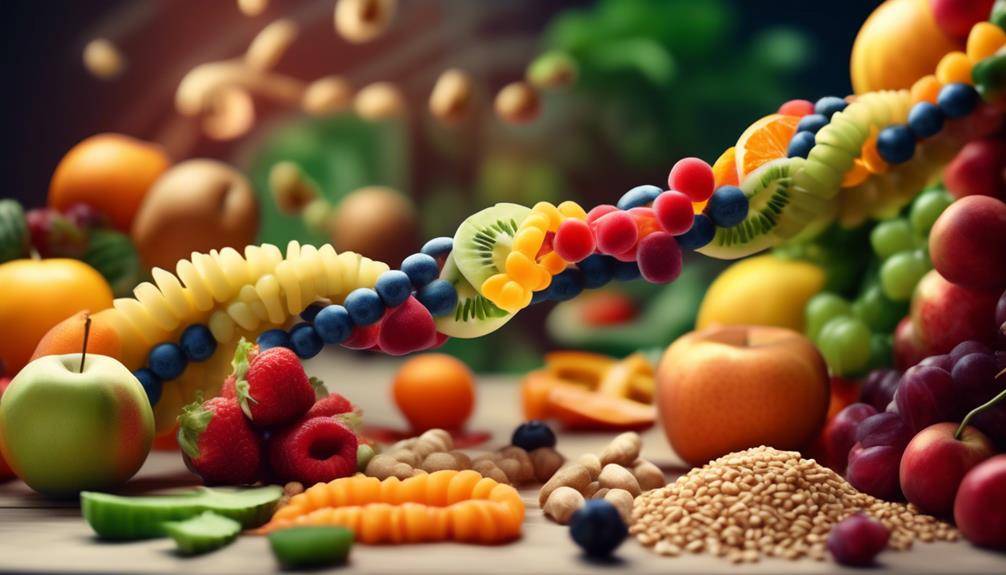What To Know About Personalized Nutrition Based on Genomics

Personalized Nutrition Based on Genomics; Imagine unlocking the blueprint of your body, where your genes hold the key to understanding your unique nutritional needs. Just as a puzzle piece fits perfectly into its designated spot, personalized nutrition based on genomics seeks to align your diet with your genetic makeup. With the advancements in genetic research, scientists are unraveling the intricate connections between our genes and how they influence our response to different nutrients. But what does this mean for you? How can this knowledge revolutionize the way we approach nutrition and ultimately impact our health? Prepare to embark on a journey where science meets nutrition, where your genes become the guiding compass for optimal well-being.
Understanding Genomic Variations
Understanding genomic variations is essential in personalized nutrition as it allows for targeted interventions based on an individual’s unique genetic makeup. Genomic variations refer to differences in the DNA sequence among individuals. These variations can influence an individual’s susceptibility to certain diseases and their response to dietary interventions.
Genomic variations play a significant role in disease risk. Certain variations in genes can increase the likelihood of developing certain diseases, such as heart disease, diabetes, and certain types of cancer. For example, variations in the FTO gene have been associated with an increased risk of obesity and type 2 diabetes. By understanding these variations, personalized nutrition can be tailored to mitigate the impact of these genetic factors on disease risk.
Moreover, genomic variations also impact an individual’s response to dietary interventions. For instance, a study published in the American Journal of Clinical Nutrition found that individuals with a specific variation in the APOA2 gene were more likely to respond positively to a low-fat diet, while individuals without this variation did not experience the same benefits. This highlights the importance of considering an individual’s genomic variations when designing personalized nutrition plans.
Role of Genetics in Nutritional Health
Genetics plays a crucial role in determining an individual’s nutritional health, influencing their response to dietary interventions and susceptibility to certain diseases. Understanding the role of genetics in nutritional health is an important area of study that can provide valuable insights into personalized nutrition and disease prevention. Here are three key points to consider:
- Genetics and Chronic Diseases: Numerous studies have shown a strong link between genetics and chronic diseases such as obesity, diabetes, cardiovascular disease, and certain types of cancer. Genetic variations can affect how our bodies metabolize certain nutrients, leading to an increased risk of developing these diseases. For example, certain genetic variations may make individuals more susceptible to obesity when consuming a high-fat diet, while others may have a lower risk due to their genetic makeup.
- Nutrigenomics and Aging: Nutrigenomics is the study of how our genes interact with the foods we eat. As we age, our nutritional needs change, and our genetic makeup plays a significant role in determining these needs. Nutrigenomics research aims to identify genetic variations that influence how our bodies respond to different nutrients, allowing for personalized dietary recommendations to promote healthy aging. By understanding our genetic predispositions, we can make informed choices about our diet and lifestyle to optimize our health as we age.
- Personalized Nutrition: Advances in genetics and technology have paved the way for personalized nutrition, where dietary recommendations are tailored to an individual’s genetic profile. By analyzing an individual’s genetic makeup, scientists can identify specific genetic variations that may impact their nutritional needs and responsiveness to certain dietary interventions. This personalized approach to nutrition can help prevent and manage chronic diseases, improve overall health outcomes, and enhance the effectiveness of dietary interventions.
Genetic Testing for Personalized Nutrition
Genetic testing for personalized nutrition offers a range of benefits. By analyzing your genetic makeup, you can gain valuable insights into how your body responds to different nutrients and dietary factors. This information can then be used to develop enhanced dietary recommendations tailored specifically to your genetic profile, ultimately optimizing your nutritional health.
Genetic Testing Benefits
By utilizing genetic testing, you can gain valuable insights into your unique genetic makeup, allowing for personalized nutrition recommendations based on your specific genetic variations. Here are some benefits of genetic testing for personalized nutrition:
- Targeted recommendations: Genetic testing can identify genetic variations that affect how your body metabolizes certain nutrients. With this knowledge, you can receive personalized recommendations tailored to your specific needs, such as adjusting your macronutrient ratios or supplementing with specific vitamins or minerals.
- Disease prevention: Genetic testing can help identify genetic markers associated with increased risk for certain health conditions, such as heart disease or diabetes. By making dietary changes based on these results, you can potentially lower your risk and improve long-term health outcomes.
- Optimal nutrient absorption: Genetic testing can uncover variations that affect your body’s ability to absorb and utilize certain nutrients. By understanding these variations, you can optimize your nutrient intake to ensure proper absorption and utilization, maximizing the benefits of your diet.
It is important to note that genetic testing has limitations and ethical considerations. These include the potential for false positives, limited research on certain genetic variations, and privacy concerns related to the storage and use of genetic information. It is essential to consult with a healthcare professional knowledgeable in genetics and nutrition to interpret and apply the results appropriately.
Personalized Nutrition Insights
With the valuable insights gained from genetic testing, you can now receive personalized nutrition insights based on your unique genetic makeup. Genomic testing benefits individuals by providing them with specific information about how their bodies metabolize nutrients and respond to different dietary components. This knowledge allows for the creation of personalized meal plans tailored to your genetic profile.
By analyzing your genetic variations, experts can identify specific dietary recommendations that can optimize your health and well-being. For example, if you have a genetic predisposition to lactose intolerance, your personalized nutrition plan would avoid or limit dairy products. Similarly, if you have a genetic variant that affects your ability to process certain fats, your plan might include alternative sources of healthy fats. Personalized nutrition insights obtained through genomic testing can greatly enhance your understanding of how to optimize your diet for optimal health.
Enhanced Dietary Recommendations
To optimize your diet for optimal health, personalized nutrition insights obtained through genomic testing can provide enhanced dietary recommendations tailored to your unique genetic makeup. This approach takes into account specific genetic variations that can impact various aspects of your health, including athletic performance and susceptibility to chronic diseases. Here are three ways in which personalized nutrition can benefit you:
- Genetic variations and athletic performance: By analyzing your DNA, personalized nutrition can identify genetic variations that may affect your athletic performance. This information can help you optimize your nutrient intake and training strategies to enhance your performance and recovery.
- Personalized nutrition for chronic diseases: Genetic testing can reveal your susceptibility to certain chronic diseases, such as cardiovascular disease or diabetes. With this knowledge, personalized dietary recommendations can be tailored to mitigate your risk factors and promote better long-term health outcomes.
- Targeted interventions: Personalized nutrition insights can guide targeted interventions, such as recommending specific vitamins, minerals, or dietary modifications to optimize your health based on your genetic profile.
Tailoring Diet to Genetic Predispositions
Tailoring your diet to your genetic predispositions can optimize your nutrition and overall health. Genetic predispositions refer to the unique variations in our DNA that can influence how our bodies metabolize and respond to different nutrients. By understanding these genetic factors, personalized meal plans can be created to cater to your specific needs.
One key area where genetic predispositions can impact diet is in the metabolism of macronutrients. For example, certain genetic variations can affect how efficiently your body processes carbohydrates or fats. By identifying these variations, personalized meal plans can be designed to provide the optimal balance of macronutrients for your genetic profile. This can help improve energy levels, maintain a healthy weight, and reduce the risk of chronic diseases.
Genetic predispositions can also influence micronutrient requirements. Some individuals may have genetic variations that affect their ability to absorb or metabolize certain vitamins and minerals. By incorporating this information into personalized meal plans, individuals can ensure they are getting sufficient amounts of essential nutrients and avoid potential deficiencies.
Furthermore, genetic predispositions can impact how our bodies respond to specific dietary components, such as caffeine or gluten. By identifying these sensitivities or intolerances, personalized meal plans can be tailored to exclude or limit these substances, reducing the risk of discomfort or adverse reactions.
Nutrigenomics and Customized Meal Plans
Understanding how genetic predispositions can impact diet sets the foundation for exploring the field of nutrigenomics and the development of customized meal plans. Nutrigenomics is a branch of nutritional genomics that studies how individual genetic variations can influence the response to dietary interventions. By analyzing an individual’s genetic makeup, personalized nutrition plans can be created to optimize health outcomes and prevent the development of chronic diseases. Customized meal plans tailored to an individual’s unique genetic profile can provide several benefits:
- Precision: Customized meal plans take into account an individual’s genetic variations, allowing for a more precise and targeted approach to nutrition. By understanding how specific genes influence nutrient metabolism, absorption, and utilization, personalized nutrition plans can be designed to address specific needs and deficiencies.
- Optimal Nutrient Intake: Nutrigenomics can identify genetic variations that affect the metabolism of certain nutrients, such as vitamins or minerals. By incorporating this information into customized meal plans, individuals can ensure they are consuming optimal amounts of these nutrients to support their overall health and wellbeing.
- Disease Prevention: Certain genetic variations can increase the risk of developing specific chronic diseases, such as cardiovascular disease or type 2 diabetes. By identifying these genetic predispositions, personalized meal plans can be created to mitigate these risks through targeted dietary interventions, such as reducing the intake of certain nutrients or increasing the consumption of others.
Optimizing Nutrient Absorption With Genomic Insights
To optimize nutrient absorption with genomic insights, it is important to understand how genomic variations can affect the body’s ability to absorb and metabolize nutrients. By analyzing an individual’s genetic makeup, insights can be gained into specific enzymes and pathways involved in nutrient metabolism. This information can then be used to personalize nutrient optimization strategies, such as adjusting dietary intake or considering targeted supplementation, to better meet an individual’s unique nutritional needs.
Genomic Variations and Absorption
By analyzing genomic variations, individuals can optimize their nutrient absorption for improved health and well-being. Genomic variations refer to the differences in DNA sequences that can influence how nutrients are absorbed and utilized by the body. Understanding these genetic variations can help tailor personalized nutrition plans to address specific nutrient deficiencies and reduce the risk of chronic diseases. Here are three key points to consider:
- Genetic variations can affect the activity of enzymes involved in nutrient metabolism, such as those responsible for breaking down carbohydrates, proteins, and fats.
- Certain variations may increase the risk of nutrient deficiencies, such as vitamin D or iron, which can lead to health issues if not addressed through appropriate dietary interventions.
- Personalized nutrition based on genomic insights can help identify and address these variations, allowing individuals to optimize their nutrient absorption and reduce the risk of chronic diseases.
Nutrient Metabolism Insights
Optimizing nutrient absorption through genomic insights can enhance overall health and well-being. Genetic markers play a crucial role in understanding an individual’s unique nutrient metabolism. By identifying specific genetic variations, personalized nutritional therapy can be tailored to optimize nutrient absorption and utilization. Genetic markers, such as single nucleotide polymorphisms (SNPs), can provide insights into how an individual’s body processes and metabolizes different nutrients.
For example, certain SNPs can affect the absorption of vitamins such as vitamin D or B12. By understanding these genetic variations, healthcare professionals can create targeted nutritional interventions to address deficiencies and optimize nutrient absorption. This personalized approach to nutrition can lead to improved overall health outcomes and better management of chronic conditions related to nutrient deficiencies.
Personalized Nutrient Optimization
Personalized nutrient optimization can be achieved through genomic insights, enhancing overall health and well-being. By utilizing personalized nutrient tracking and genomic-based dietary interventions, individuals can optimize nutrient absorption and ensure they are getting the right nutrients for their unique genetic makeup. Here are three key ways in which personalized nutrient optimization can be achieved:
- Genetic testing: By analyzing an individual’s genetic profile, specific genetic variations related to nutrient metabolism can be identified. This information can help tailor dietary recommendations to optimize nutrient absorption and utilization.
- Targeted supplementation: Based on genomic insights, personalized nutrient recommendations can be made to address any nutrient deficiencies or imbalances identified through genetic testing. This allows for targeted supplementation to optimize nutrient levels.
- Precision nutrition plans: With genomic insights, personalized nutrition plans can be developed that take into account an individual’s genetic variations and nutrient needs. This ensures that the diet is tailored to optimize nutrient absorption and utilization, promoting overall health and well-being.
Gene-Nutrient Interactions and Health Outcomes
Understanding the intricate interactions between genes and nutrients is crucial in determining their impact on health outcomes. Gene-nutrient interactions play a significant role in the development and prevention of chronic diseases. Personalized nutrition, which takes into account an individual’s genetic makeup, has the potential to revolutionize disease prevention and management.
Research has shown that gene-nutrient interactions can influence an individual’s susceptibility to chronic diseases such as cardiovascular disease, diabetes, and cancer. Genetic variations can affect how nutrients are metabolized and utilized in the body, which in turn can impact disease risk. For example, certain genetic variations have been associated with an increased risk of developing heart disease when consuming a diet high in saturated fats.
By understanding an individual’s unique genetic profile, personalized nutrition can tailor dietary recommendations to optimize health outcomes. This approach takes into account genetic variations that affect nutrient metabolism and utilization. For instance, individuals with a specific genetic variant may benefit from consuming a higher intake of certain nutrients or avoiding certain foods to reduce their risk of developing a particular disease.
The impact of personalized nutrition on disease prevention has been demonstrated in various studies. A review of randomized controlled trials found that personalized nutrition interventions, based on genetic testing, led to significant improvements in weight loss and metabolic health compared to standard dietary advice. Another study showed that individuals who received personalized dietary recommendations based on their genetic profile had greater reductions in their risk of developing type 2 diabetes compared to those receiving standard dietary advice.
Precision Nutrition for Weight Management
Precision nutrition is a targeted approach to weight management that takes into account an individual’s unique genetic profile and dietary needs. It aims to optimize health outcomes by tailoring nutrition and exercise interventions based on an individual’s specific genetic makeup. This personalized approach to weight management recognizes that each person responds differently to certain foods and exercise routines, and that one-size-fits-all approaches may not be effective for everyone.
To achieve successful weight management through precision nutrition, several key factors need to be considered:
- Optimal exercise: Finding the right exercise regimen is crucial for weight management. Genetic variations can influence an individual’s response to different types of exercise, such as cardio or strength training. By analyzing an individual’s genetic profile, personalized exercise recommendations can be made to maximize weight loss and improve overall fitness.
- Behavioral modification: Precision nutrition also takes into account an individual’s behavioral patterns and habits that may impact weight management. Genetic variations can affect an individual’s predisposition to certain behaviors, such as food cravings or emotional eating. By understanding these genetic influences, tailored behavioral modification strategies can be implemented to help individuals make sustainable lifestyle changes.
- Personalized dietary interventions: Precision nutrition utilizes genetic information to identify an individual’s unique nutritional needs and responses to different foods. Genetic variations can influence how the body processes and metabolizes nutrients, such as carbohydrates or fats. By understanding these genetic factors, personalized dietary recommendations can be provided to support healthy weight management and optimize overall health.
Future Implications of Personalized Genomic Nutrition
The future of personalized genomic nutrition holds great promise for revolutionizing our approach to health and wellness. As we continue to unravel the complexities of the human genome and our understanding of how genes interact with diet, we can envision a future where personalized genomic nutrition becomes the norm. However, this exciting prospect also brings with it future challenges and ethical considerations.
One of the major challenges that personalized genomic nutrition faces is the interpretation of genetic information. While advancements in technology have made it easier and more affordable to sequence an individual’s genome, the interpretation of this vast amount of data is still a complex task. Researchers and healthcare professionals will need to develop robust algorithms and tools to accurately analyze and interpret genetic information in the context of nutrition.
Ethical considerations also come into play when implementing personalized genomic nutrition. Issues such as privacy and consent need to be carefully addressed. Individuals may have concerns about the security and potential misuse of their genetic information. Clear guidelines and regulations will need to be established to ensure the ethical use and protection of personal genomic data.
Furthermore, access to personalized genomic nutrition may also pose ethical challenges. While this approach has the potential to greatly improve health outcomes, it could also exacerbate existing health disparities. Ensuring equitable access to personalized genomic nutrition will be crucial to prevent further health inequalities.
Personalized Nutrition Based on Genomics; Frequently Asked Questions
How Can Understanding Genomic Variations Help in Personalizing Nutrition?
Understanding genomic variations can inform personalized nutrition by identifying specific dietary requirements and tailoring nutrient intake for optimal health. This approach takes into account your unique genetic makeup to create a diet plan that suits your individual needs.
What Are the Key Factors That Link Genetics and Nutritional Health?
The key factors that link genetics and nutritional health are genetic variations and dietary choices. Additionally, the impact of lifestyle on genetic expression is crucial in understanding how nutrition can be personalized based on genomics.
How Can Genetic Testing Contribute to Personalized Nutrition?
Genetic testing benefits you by providing insights into your unique genetic makeup. Nutritional genomics applications use this information to tailor your diet and lifestyle recommendations, optimizing your health and well-being.
What Are Some Examples of Genetic Predispositions That Can Be Taken Into Account When Tailoring a Diet?
When tailoring a diet based on genetic predispositions, it’s important to consider genetic variations in metabolism and genetic predispositions to nutrient deficiencies. These factors can help personalize nutrition plans for optimal health.
How Can Nutrigenomics Be Used to Create Customized Meal Plans?
To create customized meal plans, nutrigenomic research analyzes your genetic information to understand how your genes interact with nutrients. This information helps tailor a diet that suits your unique genetic makeup and promotes optimal health.
Conclusion
In conclusion, personalized nutrition based on genomics holds great promise for improving individual health outcomes. By understanding genomic variations and their role in nutritional health, genetic testing can be utilized to tailor diet plans to individuals’ genetic predispositions. Nutrigenomics and customized meal plans can optimize nutrient absorption, while gene-nutrient interactions can have a significant impact on overall health. Precision nutrition for weight management is another area where personalized genomic nutrition can make a difference. The future implications of this approach are exciting and may revolutionize the field of nutrition.








